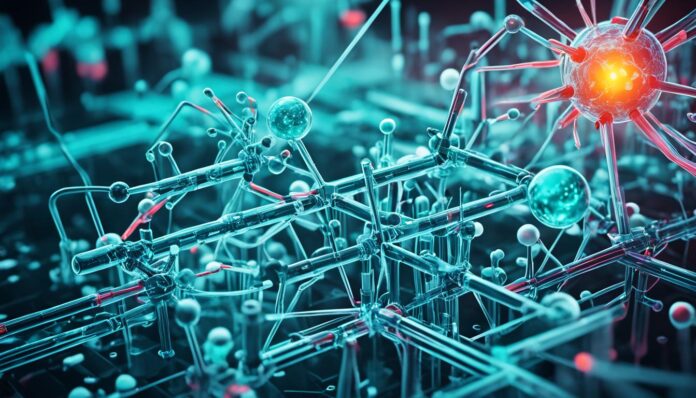
The discovery of new drugs has always been a challenging and expensive process, involving extensive timeframes and significant costs. Despite previous efforts to accelerate drug discovery through computational methods, progress has remained limited. However, the emergence of artificial intelligence (AI) has shown great potential in revolutionizing the drug discovery and development process.
With AI’s ability to analyze vast amounts of data, identify patterns, and make predictions, the pharmaceutical industry is poised to witness a transformative shift in the way drugs are discovered, designed, and brought to market. From virtual screening and drug design optimization to clinical trial data analysis and drug repurposing, the potential applications of AI in drug discovery and development are vast and promising.
Furthermore, AI can contribute to the development of personalized medicine, enabling more targeted and effective treatments. Molecular dynamics simulations and protein structure prediction can streamline the drug development process, while biomarker discovery and drug-drug interaction prediction can enhance the safety and efficacy of new medications.
Key Takeaways
- AI has the potential to revolutionize drug discovery and development by 2025.
- AI-powered virtual screening, drug design optimization, and clinical trial data analysis can accelerate the drug development process.
- AI can contribute to the development of more effective drugs, personalized medicine, and improved quality assurance.
- AI can enable drug repurposing, drug combination analysis, and patient stratification.
- Emerging AI applications in drug discovery include target selection, compound screening, and preclinical studies.
Revolutionizing the Drug Discovery Process
The use of artificial intelligence (AI) in drug discovery presents several key advantages for the pharmaceutical industry. From accelerated drug development to the creation of more effective drugs, the integration of AI-powered technologies is transforming the way we approach the entire drug discovery and development lifecycle.
Accelerated Drug Development
AI-driven platforms can significantly accelerate drug development by streamlining various stages of the process. From virtual screening and compound optimization to the analysis of clinical trial data, AI algorithms can identify promising drug candidates faster, ultimately reducing the time and costs associated with traditional drug discovery methods.
More Effective Drugs
By leveraging AI’s capabilities in predicting drugs’ bioactivity and analyzing vast datasets, pharmaceutical companies can develop more effective drugs that are better tailored to target specific disease pathways and patient populations. This enhanced precision and personalization can lead to improved therapeutic outcomes and better patient experiences.
Improved Clinical Trial Design
AI can revolutionize the clinical trial design process by identifying the most suitable patient populations, optimizing trial protocols, and predicting potential drug-drug interactions and patient stratification factors. This can result in more efficient and effective clinical trials, ultimately leading to faster regulatory approvals and the introduction of new, quality-assured medications.
Prediction of Drugs’ Bioactivity
Advanced AI algorithms can accurately predict the bioactivity of drug candidates, enabling pharmaceutical researchers to identify the most promising compounds for further development. This predictive capability can streamline the drug repurposing process, where existing drugs are evaluated for new therapeutic applications, potentially leading to the discovery of novel treatment options.
Quality Assurance
AI-powered systems can enhance quality assurance processes throughout the drug discovery and development pipeline, from identifying potential manufacturing issues to detecting adverse events during clinical trials. This proactive approach can help ensure the safety and efficacy of new medications, ultimately benefiting patients and the healthcare system as a whole.
Drug Repurposing
By leveraging AI’s ability to analyze vast amounts of data, including existing drug libraries and disease-related information, pharmaceutical companies can uncover new drug repurposing opportunities. This can lead to the identification of existing drugs that can be repurposed to treat different conditions, potentially accelerating the development of new therapeutic options.
Drug Combination Analysis
AI algorithms can also assist in the exploration of drug combination analysis, identifying synergistic effects between different drug candidates. This can guide the development of more effective combination therapies, particularly for complex diseases where a single drug may not be sufficient to achieve the desired therapeutic outcome.
Patient Stratification
AI-driven patient stratification techniques can help pharmaceutical companies better understand and segment patient populations, enabling the development of more personalized treatment approaches. By identifying specific patient characteristics and biomarkers, AI can guide the selection of the most appropriate drug candidates and clinical trial participants, ultimately leading to improved patient outcomes.

Potential Applications of AI in Drug Discovery and Development by 2025
Artificial intelligence (AI) has the potential to revolutionize the drug discovery and development process, making it more efficient and streamlined than traditional methods. Among the key applications of AI that are expected to have a significant impact by 2025 are target selection and validation, compound screening and lead optimization, and preclinical studies.
Target Selection and Validation
AI-powered algorithms can analyze vast amounts of data, including genomic, proteomic, and chemical information, to identify and validate potential drug targets more effectively than manual approaches. This can lead to the identification of novel therapeutic targets and accelerate the early stages of the drug discovery process.
Compound Screening and Lead Optimization
AI can be used to rapidly screen and evaluate large chemical libraries, identifying promising drug candidates and optimizing their properties, such as potency, selectivity, and pharmacokinetics. This can significantly reduce the time and cost associated with the compound screening and lead optimization stages of drug development.
Preclinical Studies
AI models can be used to simulate and predict the outcomes of preclinical studies, including toxicology, pharmacology, and drug-target interactions. This can help identify potential issues early in the development process, reducing the risk of failure and enabling more efficient resource allocation.
| Application of AI | Potential Impact |
|---|---|
| Target Selection and Validation | Accelerates the identification of novel therapeutic targets |
| Compound Screening and Lead Optimization | Reduces the time and cost associated with drug candidate evaluation |
| Preclinical Studies | Enhances the predictive accuracy of preclinical studies, reducing the risk of failure |
Conclusion
As the pharmaceutical industry looks towards the future, the potential applications of artificial intelligence (AI) in drug discovery and development by 2025 are truly remarkable. By harnessing the power of advanced algorithms and machine learning, you can expect to see a remarkable transformation in the way new drugs are identified, evaluated, and brought to market.
From accelerated drug development timelines and the creation of more effective treatments, to improved clinical trial design and enhanced quality assurance processes, AI is poised to revolutionize every aspect of the drug discovery journey. Additionally, the ability to leverage AI for drug repurposing, drug combination analysis, and patient stratification will unlock new possibilities in personalized medicine, further improving patient outcomes.
As you look to the future, embrace the transformative potential of AI in the pharmaceutical industry. By staying at the forefront of these advancements, you can position your organization for success and deliver life-changing therapies to the patients who need them most. The future of drug discovery is here, and it’s driven by the incredible capabilities of artificial intelligence.
FAQ
What are the potential applications of AI in drug discovery and development by 2025?
The potential applications of AI in drug discovery and development by 2025 are expected to revolutionize the pharmaceutical industry. By accelerating the drug development process, creating more effective drugs, improving clinical trial design, and enhancing various quality assurance processes, AI is poised to transform the landscape of drug discovery and development.
How can AI help accelerate the drug development process?
AI can accelerate the drug development process by enabling faster virtual screening, optimizing drug design, and improving the analysis of clinical trial data. These advancements can significantly reduce the time and costs associated with bringing new drugs to market.
What role can AI play in developing more effective drugs?
AI can help develop more effective drugs by enhancing the prediction of a drug’s bioactivity, identifying novel drug targets, and optimizing molecular structures to improve a drug’s efficacy and safety profile. This can lead to the creation of more potent and targeted therapeutics.
How can AI improve clinical trial design?
AI can improve clinical trial design by analyzing large datasets to identify the most suitable patient populations, optimize trial protocols, and predict the likelihood of trial success. This can increase the probability of successful clinical outcomes and reduce the costs associated with failed trials.
What other applications of AI can benefit drug discovery and development?
Other potential applications of AI in drug discovery and development include drug repurposing, drug-drug interaction prediction, patient stratification, and quality assurance processes. These advancements can help identify new uses for existing drugs, minimize adverse effects, and ensure the safety and efficacy of pharmaceutical products.
